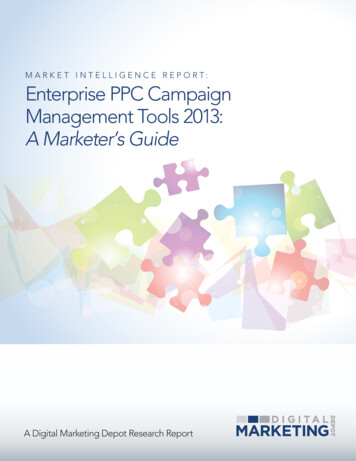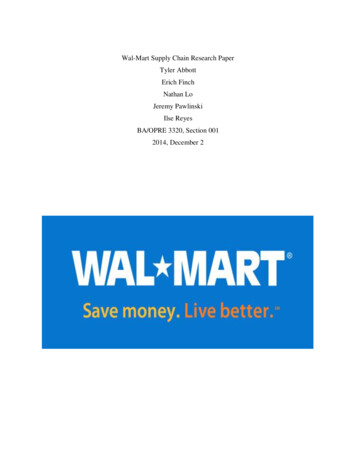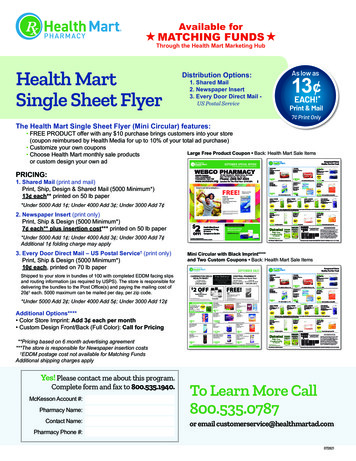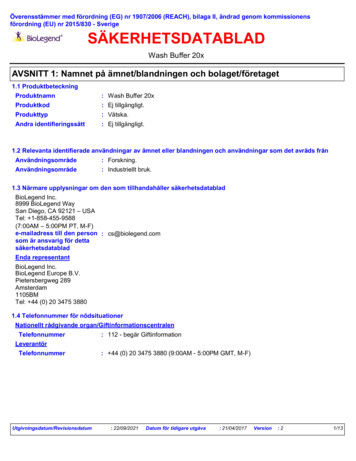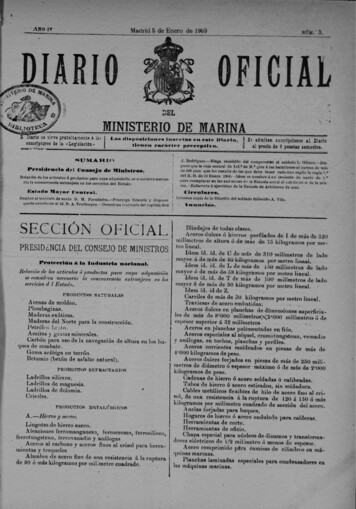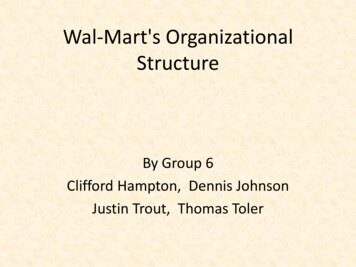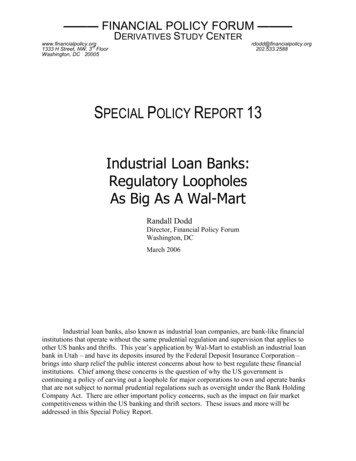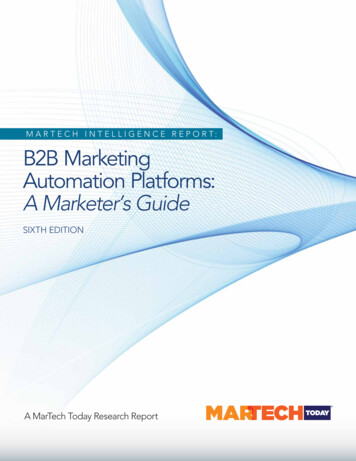
Transcription
M A R T E C H I N T E L L I G E N C E R E P O R T:B2B MarketingAutomation Platforms:A Marketer’s GuideSIXTH EDITIONA MarTech Today Research Report
M A R T E C H I N T E L L I G E N C E R E P O R T:B2B Marketing Automation Platforms: A Marketer’s GuideTable of ContentsScope and methodology. 2B2B marketing automation overview . 3Table 1: Marketing budgets and martech spend fall in 2017. 3Marketing automation ease of implementation more important than pricing . 3Table 2: What are the most important evaluation criteria forselecting a marketing automation system?. 4Consolidation continues as enterprise clouds use AI to solidify positions . 4B2B marketing automation platform features . 5Dynamic content creation . 6Lead management. 6Predictive analytics. 7Mobile marketing. 7Account-based marketing (ABM). 7Social/lead profile integration . 7Native CRM integration. 7Table 3: Select B2B marketing automation platform features. 8Third-party software connectivity. 9Choosing a B2B marketing automation platform . 9The benefits of using B2B marketing automation. 9B2B marketing automation platform pricing. 10Recommended steps to making an informed purchase. 10Step One: Do you need a marketing automation platform? . 10Step Two: Identify and contact appropriate vendors. 12Step Three: Scheduling the demo. 12Step Four: Check references, negotiate a contract . 13Conclusion. 14Vendor profiles. 15Act-On Software . 15Adobe Campaign. 17Autopilot. 19eTrigue . 21Higher Logic. 23HubSpot. 25IBM Watson Marketing . 28iContact Pro. 30Infusionsoft. 32MailChimp. 34Marketo . 36Oracle Eloqua . 39Salesforce Pardot . 41Salesfusion. 44SharpSpring. 46Resources. 48 2018 Third Door Media, Inc. http://thirddoormedia.com1Email: martechtoday@digitalmarketingdepot.com
M A R T E C H I N T E L L I G E N C E R E P O R T:B2B Marketing Automation Platforms: A Marketer’s GuideScope and methodologyThis report examines the current market for B2B marketing automation platforms and theconsiderations involved in implementing marketing automation software. It addresses thefollowing questions: What factors are driving B2B marketing automation platform use?What capabilities do B2B marketing automation platforms provide?Does my company need a marketing automation platform?Who are the leading players in B2B marketing automation?How do I evaluate which platform is best for my business?If you are considering licensing a B2B marketing automation platform, this report will helpyou decide whether or not you need to. The report has been completely updated from itsFebruary 2017 publication to include the latest industry statistics, developing market trendsand new vendor profiles and product updates.For the purposes of this report, B2B marketing automation is defined as follows: The use ofsoftware and web-based services to execute, manage and automate repetitive marketing tasksand processes to more effectively market through multiple channels (i.e., email, mobile, socialmedia and websites). Marketing automation focuses on the definition, scheduling, segmentation and tracking of marketing campaigns, allowing the marketing and sales organizations tonurture leads with highly personalized content aimed at attracting and retaining customers.The 15 vendors profiled in this report represent some of the choices available for B2B marketing automation platforms; they are not a comprehensive list of B2B marketing automationvendors. This report is not a recommendation of any marketing automation platform or company, and is not meant to be an endorsement of any particular product, service or vendor.This report was prepared by conducting in-depth interviews with leading vendors and industry experts in January and February 2018. These, in addition to third-party research, form thebasis for this report.March 2018Editorial Advisor:Anand Thaker, CEO, IntelliPhiWriters:Karen Burka, Senior Research Consultant, Third Door MediaBrian Kelly, Principal, Candlewood CreativeEditor:Claire Schoen, Director, Marketing Services Content, Third Door Media 2018 Third Door Media, Inc. htp://thirddoormedia.com2Email: martechtoday@digitalmarketingdepot.com
The affordable,powerful alternativeto expensive marketingautomation platforms. All the Features,Fraction of the CostSee why 1,400 marketing agenciesand 6,500 businesses choose us.Unlimited users Unlimited support No annual contractsharpspring.com
M A R T E C H I N T E L L I G E N C E R E P O R T:B2B Marketing Automation Platforms: A Marketer’s GuideB2B marketing automation overviewAccountability and ROI have become the top marketing automation priorities, as CMOs faceincreasing pressure to show bottom-line results. Improving ROI and optimizing productivitys lead the list of CMO marketing automation objectives, according to Ascend2’s most recentState of Marketing Automation survey.Rather than spending more, CMOs and CMTOs (Chief Marketing Technology Officers) arenow looking to market more efficiently, with the focus on improving their organizations’ use ofthe myriad marketing technology (martech) systems already in place. For the first time in threeyears, marketing budgets fell in 2017 – from 12% to 11% of company revenue – according toGartner’s CMO Spend Survey 2017-2018. And, although martech spending still accounted for22% of marketing budgets in 2017, that figure represents a 15% year-over-year decline (seeTable 1).Accountability andROI have becomethe top marketingautomationpriorities, as CMOsface increasingpressure to showbottom-line results.Table 1: Marketing budgets and martech spend fall in 201730%27%25%22%20%15%12.1%11.3%10%5%0%Marketing budgets2016Martech spend as a %of marketing budget2017Source: CMO Spend Survey 2017-2018, GartnerThis conservative view of spending is not projected to change anytime soon. Gartner foundthat one-third of CMOs expect their budgets to be cut or frozen in 2018, and only 15% expecta significant budget increase.Ease of implementation54%Ease of implementation more important than pricingCost of ownership/pricing43%Many B2B marketing organizations struggle with using the full feature set of their marketingautomation platforms, citing difficulties in onboarding and ongoing use. Ascend2’s surveyAnalyticscapabilities40%found that 85%of marketerssay that implementation of a marketing automationsystem iseither “somewhat” or “extremely” complicated. More than half of marketers surveyed also saythat easeCross-platformof implementationis the most important criteria for selectinga marketing automationintegration39%system – ahead of both pricing and analytics capabilities (see Table 2).Technical supportIndustry analyst ratingsClients/recommendations 2018 Third Door Media, Inc. http://thirddoormedia.com38%23%22%3Email: martechtoday@digitalmarketingdepot.com
5%M A R T E C H I N T E L L I G E N C E R E P O R T:0%B2B Marketing AutomationPlatforms:MartechA Marketer’sMarketing budgetsspend as a % Guideof marketing budget20162017Table 2: What are the most important evaluation criteria forselecting a marketing automation system?Ease of implementation54%Cost of ownership/pricing43%Analytics capabilities40%Cross-platform integration39%Technical support38%Industry analyst ratingsClients/recommendations23%22%Source: State of Marketing Automation, Ascend2 and Research PartnersIn response, marketing automation platform vendors have expanded training programs andadd-on professional services to improve platform ease of use. Online communities – forboth customers and developers – have also become increasingly important to strengthenplatform support, advocacy and market penetration. Many marketing automation platformvendors have roots in email marketing, which continues to be a core function – and often theonly function that customers use. However, the platforms offer an evolving range of features,including advanced lead management, account-based marketing tools, predictive analyticsand open architectures to support the growing martech ecosystem.But whether it’s the marketers or the platforms that have become more sophisticated, severalvendors report that a majority of customers have integrated their marketing automationplatforms with their CRMs, which is fundamental for account based marketing (ABM). Many arealso using the platforms for more sophisticated drip and nurturing campaigns, multichannel(including mobile) marketing and event marketing. Platform vendors have also steppedup their development of artificial intelligence (AI), with the goal of providing customerswith machine-learning insights that shift more of the analytics work from the user to theplatform. AI-generated features include automated targeting and personalization, predictiveoptimization/recommendations and smart tagging. On vendor roadmaps for 2018 arepredictive pathing and automated segmentation.Still, just one-third of marketers surveyed say that their marketing automation strategy is “verysuccessful” at achieving important objectives, according to Ascend2’s State of MarketingAutomation. Platform vendors acknowledge that marketers need comprehensive training ontheir solutions and go-to-market strategies to generate faster results and prevent churn.Consolidation continues as enterprise clouds use AI to solidify positionsThe enterprise B2B marketing automation market is concentrated among a few cloud vendors,including Salesforce, Oracle and Adobe, which have devoted significant resources to developproprietary AI solutions as market differentiators. 2018 Third Door Media, Inc. http://thirddoormedia.com4Email: martechtoday@digitalmarketingdepot.com
M A R T E C H I N T E L L I G E N C E R E P O R T:B2B Marketing Automation Platforms: A Marketer’s GuideSalesforce launched Einstein in September 2016 across several of its cloudsolutions, including its Marketing Cloud, while Adobe introduced Sensei twomonths later in November 2016. Adobe Sensei is available across a numberof Adobe cloud products, including the Adobe Experience Cloud, AdobeCreative Cloud and Adobe Document Cloud.At the same time, Adobe announced a strategic partnership with Microsoftto integrate marketing automation platform Adobe Campaign with MicrosoftDynamics 365, the company’s CRM. The two companies are co-selling theintegrated solution, expanding Adobe’s and Microsoft’s reach within themarketing automation landscape.To better compete against these large, well-funded companies in the higherend of the market, the publicly traded Marketo went private in August 2016and was acquired by private equity firm Vista Equity Partners. With a newCEO in place, Marketo purchased ToutApp, a provider of sales engagementsoftware, in spring 2017. The company also introduced an AI-driven solution,Marketo Content, as part of its Q3 2017 product release.A more crowded field of vendors serves the small and mid-sized business(SMB) market, and consolidation has begun. Cloud engagement platformdeveloper Higher Logic purchased Real Magnet in October 2017 (seesidebar). At the same time, Higher Logic also acquired Informz, a marketingautomation platform for non-profit and association marketers.In January 2018, Act-On Software announced a corporate restructuringthat included closing its two CA-based facilities and eliminating 15% of itsworkforce. The staff reduction targeted sales and marketing positions, as thecompany announced plans to hire more software developers to focus on theplatform’s technology.Select marketing automationfinancial transactionsJanuary 2018 Act-On restructures operations,closing two CA-based facilities andreducing workforce by 15%October 2017 Higher Logic acquires Real Magnet(as well as non-profit marketingautomation platform, Informz)June 2017 AutoPilot secures 12M in fundingled by Blackbird VenturesApril 2017 Marketo acquires ToutAppNovember 2016 Adobe partners with Microsoft tointegrate Adobe Campaign intoMicrosoft Dynamics 365August 2016 Vista Equity Partners acquirespublicly traded Marketo for 1.8BSource: Third Door MediaAutopilot secured 12 million in a June 2017 funding round, led by newinvestor Blackbird Ventures. The company subsequently introduced a new product, Insights,which officials describe as a “fitness tracker” for marketers.B2B marketing automation platformcapabilitiesVirtually every B2B marketing automation vendor profiled in this report provides tools for emailcampaign development and execution (including landing pages), as well as lead capture,scoring and nurturing. The platforms also typically provide centralized marketing databasesand a basic level of reporting on web traffic, visitor behavior and campaign results. Combined,the core features offered by most B2B marketing automation platforms profiled in this reportinclude: Email marketing and landing page development;Lead management (i.e., capture, scoring and nurturing);Native CRM integration; andAPIs or app marketplaces for faster martech system access. 2018 Third Door Media, Inc. http://thirddoormedia.com5Email: martechtoday@digitalmarketingdepot.com
M A R T E C H I N T E L L I G E N C E R E P O R T:B2B Marketing Automation Platforms: A Marketer’s GuideThe market is quickly evolving, as B2B marketers demand integrated marketing functionalitythat rapidly translates into bottom-line return. Vendors continue to add more advancedfeatures to provide marketing end-users with the ability to build, track and manage campaignsacross channels and/or devices, and monitor the flow of leads as they move from marketing tosales. These features include, but are not limited to: Dynamic content generation (email, landing pages and/or website);Account-based marketing (ABM);Mobile marketing;AI-based predictive analytics; andSocial/lead profile integration.Progressive profilingis often offeredto pre-populateforms with knowndata and use a dripapproach to captureadditional prospectinformation eachtime they interactwith campaigns.The following section discusses several of these core and advanced marketing automationcapabilities in more depth (see Table 3).Dynamic content creationVirtually all marketing automation platforms provide the ability to create, send and measurepersonalized email campaigns. Where they differ is in how email, landing page and websitecontent is created and personalized. Some vendors offer wizard-based campaign designor content templates, while others provide a more customized approach. There are alsodifferences in static vs. dynamically generated content, which adjusts on the fly as prospectsinteract with a website or form. Progressive profiling is often offered to pre-populate formswith known data and use a drip approach to capture additional prospect information each timethey interact with campaigns.Message deliverability is also an important factor to consider. Some B2B marketing automationvendors offer dedicated IP addresses to improve deliverability, and/or monitor deliverabilityby including ReturnPath or other email deliverability services. Email previewing is an advancedfunction, but may be critical to marketers that want to reach their audience through mobiledevices and see what their message will look like on smaller screens.Lead managementLead management comprises three functions: lead capture, lead scoring and lead nurturing.Leads are captured from a variety of sources that feed the marketing automation database,including (but not limited to) website visitors, social media, paid digital campaigns, emailmarketing respondents, trade show attendees and purchased third-party lists. Platforms willvary based on the ease with which additional lead sources can be captured, such as through anopen API, or whether the platform offers landing page optimization.Lead scoring assigns a value to each lead based on a predetermined set of rules or criteria.Traditional lead scoring models are generally based on two sets of data values: behavior (i.e.,site purchases, browsing, social posts) and demographics/firmographics. Many B2B marketingautomation platforms now offer predictive scoring, which can incorporate hundreds of datapoints by sourcing websites, social networks and internal systems such as the CRM andmarketing database itself to calculate scores.Lead nurturing is the process of keeping prospects engaged with the brand through periodic,personalized communications or campaigns until they are ready to buy. Marketing automationplatforms may offer a number of pre-built nurturing steps or actions, as well as allow users tocustomize their content and process. These efforts are meant to build a relationship betweenthe brand and its prospects, and drive interaction with sales if and when the prospect is ready. 2018 Third Door Media, Inc. http://thirddoormedia.com6Email: martechtoday@digitalmarketingdepot.com
M A R T E C H I N T E L L I G E N C E R E P O R T:B2B Marketing Automation Platforms: A Marketer’s GuidePredictive analyticsSeveral platformshave invested inVirtually all of the B2B marketing automation platforms profiled in this report provide a standard set ofanalytics that track quantifiable data such as website visitor activity, pages viewed, time spent on site, artificial intelligenceemails opened, content downloaded and campaign responses. More vendors are offering predictive (AI) to go a stepanalytics and models based on machine learning, which uses algorithms to process data and surfacebeyond machinetrends or insights that enable marketers to customize visitor experiences and marketing campaigns.learning and usetechnology toSeveral platforms have invested in artificial intelligence (AI) to go a step beyond machine“mimic” humanlearning and use technology to “mimic” human intelligence and recommend marketingactions or outcomes. These may include highly personalized website content or productintelligence andrecommendations based on analysis of consumption trends, on-site behavior, firmographicsrecommendand CRM data. Other vendors rely on plug-and-play integration with predictive analytics toolssuch as Mintigo and Lattice Engines, to offer greater analytics and personalization capabilities. marketing actions oroutcomes.Mobile marketingCreating an engaging experience for mobile prospects and customers is a must-have capability.As a result, many B2B marketing automation platforms include responsive templates for email,landing pages and web forms. Several vendors integrate with email testing tools such asLitmus, to allow users to preview email marketing messages across email clients and devices.More advanced mobile marketing features include SMS/texting, in-app marketing and remoteplatform management from mobile devices. In-app marketing features can include “push”notifications or ads based on geography (i.e., geo-fencing or beaconing) or during events. B2Bmarketing automation vendors have also expanded platform access to mobile users, movingbeyond automated alerts and remote data collection to full platform management.Account-based marketing (ABM)Aligning marketing initiatives with sales teams has become the leading ABM priority fora majority of marketers, according to Ascend2 research. The goal is to target marketingprograms to prospect or customer buying teams, rather than individuals who may havemoved into new positions or firms. Many times, a B2B buyer is not a single person. The largerthe purchase, the more people and departments are involved. B2B marketing automationvendors continue to add new ABM features to their platforms to enable this strategy, includingenhanced account nurturing and predictive scoring capabilities.Social/lead profile integrationMost of the B2B marketing automation vendors profiled in this report provide some levelof social media publishing, sharing and tracking within the platform for networks such asFacebook, Instagram, Twitter and LinkedIn. Some platforms provide more advanced socialmedia tools to monitor social posts and add social behavior to lead profiles, often using socialengagement as a scoring factor. Other platforms enable the use of social media sign-on tocapture social profile data and build lead profiles.Native CRM integrationWith more businesses seeking to align marketing with sales, native or out-of-the-boxintegration with CRM systems has become a critical feature for B2B marketing automationplatforms. Salesforce, Microsoft Dynamics 365, Oracle NetSuite and Sugar CRM are some ofthe most commonly available connectors. Data is synchronized between the two systems andshared in both directions at frequent intervals. For example, data that is added by a sales repto an account record in the CRM will be automatically added to the record in the marketingautomation platform for marketing end-users to view and act upon, as well. 2018 Third Door Media, Inc. http://thirddoormedia.com7Email: martechtoday@digitalmarketingdepot.com
M A R T E C H I N T E L L I G E N C E R E P O R T:B2B Marketing Automation Platforms: A Marketer’s GuideTable 3: Select B2B marketing automation platform featuresDynamiccontent creationPlatformPredictiveAnalyticsLeadmanagement MachineAIlearningMobile accessSocialintegratedABMw/ leadprofilesNative CRMintegrationThird-party ndingpages44488444IN, MD, ONS,SF, SU44AdobeCampaign1Email ,SF,SAP44Email44444884SF44eTrigueEmailLanding pages44444448MD, SF, SU48Higher LogicEmail /landingpages/site44444484INF, MD,ONS, SF, SU48HubSpotEmail /landingpages/sitepersonalization44444444HUB, SF44IBM WatsonMarketingEmail /landingpages/sitepersonalization44444444MD, ONS,SF, SU44iContact ProEmail/Landing pages48884444SF44InfusionsoftEmail/Landing pages44488848Built-in CRM44MailChimpEmail44888888NA44MarketoEmail /landingpages/sitepersonalization44444444MD, SF44Oracle EloquaEmail /landingpages/sitepersonalization44444444MD, SAP, SF44Salesforce PardotEmail fusionEmail48844444BH, MD, SG,IN, ONS, SF,SU44SharpSpringEmail /landingpages44844484SF44AutopilotSocial integration available through Adobe Social, a separately priced product.CRM abbreviations: BH (Bullhorn), HUB (HubSpot), IN (Infor), Infusionsoft (INF), Microsoft Dynamics 365 (MD), OCRMON (Oracle CRM On Demand), ONS (Oracle NetSuite),SF (Salesforce), SG (Sage CRM), SU (SugarCRM).1Source: Third Door Media 2018 Third Door Media, Inc. http://thirddoormedia.com8Email: martechtoday@digitalmarketingdepot.com
M A R T E C H I N T E L L I G E N C E R E P O R T:B2B Marketing Automation Platforms: A Marketer’s GuideThird-party software connectivityB2B marketing automation vendors continue to open their platform architectures through APIsand app marketplaces to offer customers access to an expansive array of third-party martechsoftware systems. The app marketplaces provide faster “plug-and-play” access between thesystems, although there may be additional fees to purchase the marketplace apps. If a preferredmartech app is not available on a marketing automation vendor’s marketplace it doesn’t meanthat the two systems won’t connect – it means that some customization will be required. API usedoes incur additional charges, generally on a per-call basis for each data download.Choosing a B2B marketingautomation platformB2B marketingautomation vendorscontinue to opentheir platformarchitecturesthrough APIs andapp marketplacesto offer customersaccess to anexpansive array ofthird-party martechsoftware systems.The benefits of using B2B marketing automationThe proliferation of digital channels and devices has made it difficult for B2B marketers toaccurately target prospects with the right messages, on the right devices, at the right times.Prospects are managing more of the buying process themselves, creating decision short listsby researching brand websites and social channels without ever speaking to a sales rep. To beeffective, B2B marketers must be creative, targeted and aligned with sales goals; they mustalso have greater visibility into buyer attributes and behaviors.Faced with these challenging market dynamics and increasing ROI pressure, B2B marketers atcompanies of all sizes can gain these benefits from a marketing automation platform: Increased marketing efficiency. Automating time-consuming, manual tasks around contentcreation, management and personalization; campaign scheduling and execution; datahygiene (i.e. duplicate or inconsistent data residing in various silos); communication withsales; and lead nurturing saves time and improves productivity. Enhanced ability to generate more and better qualified leads. Marketing automationcan combine multiple criteria, including demographic, firmographic and behavioral data(pages visited, downloads, filled out forms) with a lead-scoring system to generate andidentify sales-qualified leads. A multichannel view of prospect behavior. Today’s marketing automation platforms areintegrating multiple channels and devices – including social media and mobile -- to createmore comprehensive prospect profiles and holistic views of prospect behavior. Better alignment of sales and marketing goals. Marketing automation software can helpalign sales and marketing efforts to ensure that sales reps are working with sales-readyleads. By working cooperatively to set scoring parameters and define qualified leads, salesand marketing become one team. Marketing works on building relationships with earlystage leads to enable sales to focus their efforts on the most highly qualified prospects. Improved lead conversion and ROI. Numerous studies have found that using a marketingautomation system can increase conversions. Forrester found that B2B marketersimplementing marketing automation experience a 10% increase in their sales-pipelinecontribution. Marketing automation can result in a 15% increase in sales productivity as wellas a 12% decrease in marketing overhead, according to tech research firm Nucleus Research. 2018 Third Door Media, Inc. http://thirddoormedia.com9Email: martechtoday@digitalmarketingdepot.com
M A R T E C H I N T E L L I G E N C E R E P O R T:B2B Marketi
Marketing automation focuses on the definition, scheduling, segmenta-tion and tracking of marketing campaigns, allowing the marketing and sales organizations to . Dynamics 365, the company's CRM. The two companies are co-selling the integrated solution, expanding Adobe's and Microsoft's reach within the .
